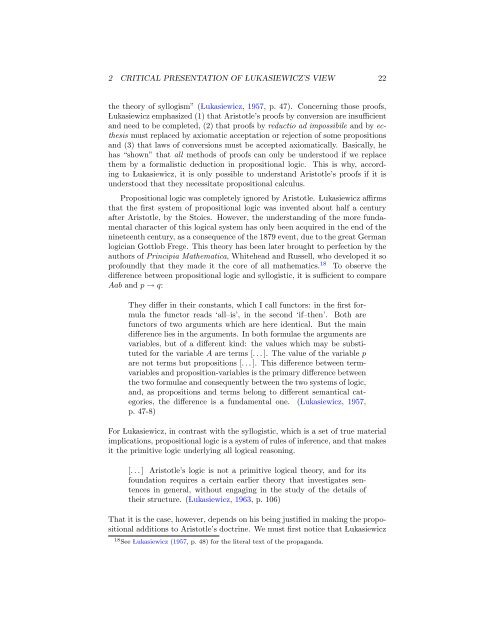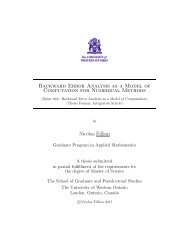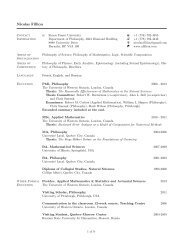Two Accounts of Aristotle's Logic - Nicolas Fillion
Two Accounts of Aristotle's Logic - Nicolas Fillion
Two Accounts of Aristotle's Logic - Nicolas Fillion
You also want an ePaper? Increase the reach of your titles
YUMPU automatically turns print PDFs into web optimized ePapers that Google loves.
2 CRITICAL PRESENTATION OF ̷LUKASIEWICZ’S VIEW 22<br />
the theory <strong>of</strong> syllogism” (̷Lukasiewicz, 1957, p. 47). Concerning those pro<strong>of</strong>s,<br />
̷Lukasiewicz emphasized (1) that Aristotle’s pro<strong>of</strong>s by conversion are insufficient<br />
and need to be completed, (2) that pro<strong>of</strong>s by reductio ad impossibile and by ecthesis<br />
must replaced by axiomatic acceptation or rejection <strong>of</strong> some propositions<br />
and (3) that laws <strong>of</strong> conversions must be accepted axiomatically. Basically, he<br />
has “shown” that all methods <strong>of</strong> pro<strong>of</strong>s can only be understood if we replace<br />
them by a formalistic deduction in propositional logic. This is why, according<br />
to ̷Lukasiewicz, it is only possible to understand Aristotle’s pro<strong>of</strong>s if it is<br />
understood that they necessitate propositional calculus.<br />
Propositional logic was completely ignored by Aristotle. ̷Lukasiewicz affirms<br />
that the first system <strong>of</strong> propositional logic was invented about half a century<br />
after Aristotle, by the Stoics. However, the understanding <strong>of</strong> the more fundamental<br />
character <strong>of</strong> this logical system has only been acquired in the end <strong>of</strong> the<br />
nineteenth century, as a consequence <strong>of</strong> the 1879 event, due to the great German<br />
logician Gottlob Frege. This theory has been later brought to perfection by the<br />
authors <strong>of</strong> Principia Mathematica, Whitehead and Russell, who developed it so<br />
pr<strong>of</strong>oundly that they made it the core <strong>of</strong> all mathematics. 18 To observe the<br />
difference between propositional logic and syllogistic, it is sufficient to compare<br />
Aab and p → q:<br />
They differ in their constants, which I call functors: in the first formula<br />
the functor reads ‘all–is’, in the second ‘if–then’. Both are<br />
functors <strong>of</strong> two arguments which are here identical. But the main<br />
difference lies in the arguments. In both formulae the arguments are<br />
variables, but <strong>of</strong> a different kind: the values which may be substituted<br />
for the variable A are terms [. . . ]. The value <strong>of</strong> the variable p<br />
are not terms but propositions [. . . ]. This difference between termvariables<br />
and proposition-variables is the primary difference between<br />
the two formulae and consequently between the two systems <strong>of</strong> logic,<br />
and, as propositions and terms belong to different semantical categories,<br />
the difference is a fundamental one. (̷Lukasiewicz, 1957,<br />
p. 47-8)<br />
For ̷Lukasiewicz, in contrast with the syllogistic, which is a set <strong>of</strong> true material<br />
implications, propositional logic is a system <strong>of</strong> rules <strong>of</strong> inference, and that makes<br />
it the primitive logic underlying all logical reasoning.<br />
[. . . ] Aristotle’s logic is not a primitive logical theory, and for its<br />
foundation requires a certain earlier theory that investigates sentences<br />
in general, without engaging in the study <strong>of</strong> the details <strong>of</strong><br />
their structure. (̷Lukasiewicz, 1963, p. 106)<br />
That it is the case, however, depends on his being justified in making the propositional<br />
additions to Aristotle’s doctrine. We must first notice that ̷Lukasiewicz<br />
18 See ̷Lukasiewicz (1957, p. 48) for the literal text <strong>of</strong> the propaganda.




